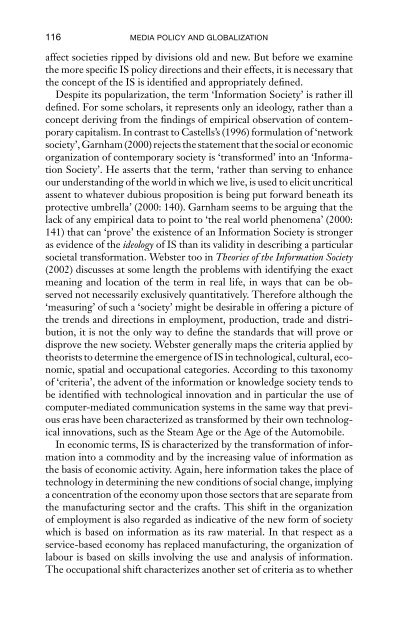Media Policy and Globalization - Blogs Unpad
Media Policy and Globalization - Blogs Unpad
Media Policy and Globalization - Blogs Unpad
Create successful ePaper yourself
Turn your PDF publications into a flip-book with our unique Google optimized e-Paper software.
116 MEDIA POLICY AND GLOBALIZATION<br />
affect societies ripped by divisions old <strong>and</strong> new. But before we examine<br />
the more specific IS policy directions <strong>and</strong> their effects, it is necessary that<br />
the concept of the IS is identified <strong>and</strong> appropriately defined.<br />
Despite its popularization, the term ‘Information Society’ is rather ill<br />
defined. For some scholars, it represents only an ideology, rather than a<br />
concept deriving from the findings of empirical observation of contemporary<br />
capitalism. In contrast to Castells’s (1996) formulation of ‘network<br />
society’, Garnham (2000) rejects the statement that the social or economic<br />
organization of contemporary society is ‘transformed’ into an ‘Information<br />
Society’. He asserts that the term, ‘rather than serving to enhance<br />
our underst<strong>and</strong>ing of the world in which we live, is used to elicit uncritical<br />
assent to whatever dubious proposition is being put forward beneath its<br />
protective umbrella’ (2000: 140). Garnham seems to be arguing that the<br />
lack of any empirical data to point to ‘the real world phenomena’ (2000:<br />
141) that can ‘prove’ the existence of an Information Society is stronger<br />
as evidence of the ideology of IS than its validity in describing a particular<br />
societal transformation. Webster too in Theories of the Information Society<br />
(2002) discusses at some length the problems with identifying the exact<br />
meaning <strong>and</strong> location of the term in real life, in ways that can be observed<br />
not necessarily exclusively quantitatively. Therefore although the<br />
‘measuring’ of such a ‘society’ might be desirable in offering a picture of<br />
the trends <strong>and</strong> directions in employment, production, trade <strong>and</strong> distribution,<br />
it is not the only way to define the st<strong>and</strong>ards that will prove or<br />
disprove the new society. Webster generally maps the criteria applied by<br />
theorists to determine the emergence of IS in technological, cultural, economic,<br />
spatial <strong>and</strong> occupational categories. According to this taxonomy<br />
of ‘criteria’, the advent of the information or knowledge society tends to<br />
be identified with technological innovation <strong>and</strong> in particular the use of<br />
computer-mediated communication systems in the same way that previous<br />
eras have been characterized as transformed by their own technological<br />
innovations, such as the Steam Age or the Age of the Automobile.<br />
In economic terms, IS is characterized by the transformation of information<br />
into a commodity <strong>and</strong> by the increasing value of information as<br />
the basis of economic activity. Again, here information takes the place of<br />
technology in determining the new conditions of social change, implying<br />
a concentration of the economy upon those sectors that are separate from<br />
the manufacturing sector <strong>and</strong> the crafts. This shift in the organization<br />
of employment is also regarded as indicative of the new form of society<br />
which is based on information as its raw material. In that respect as a<br />
service-based economy has replaced manufacturing, the organization of<br />
labour is based on skills involving the use <strong>and</strong> analysis of information.<br />
The occupational shift characterizes another set of criteria as to whether

















